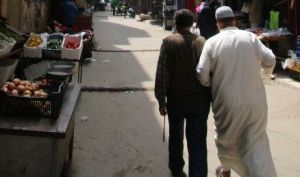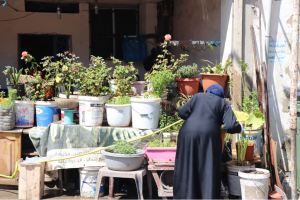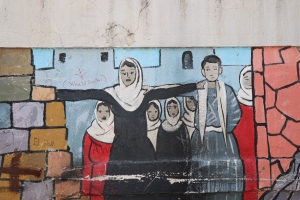When we ‘sweep away the professional, intimate, spiritual and even socio-economic past of refugees,’ what impact does this have on our understanding and (non)engagement with forcibly displaced people, including displaced religious leaders? In this post, Dr Estella Carpi, Southern Responses Research Associate, draws on her research with Syrian religious leaders in Lebanon who have worked as key intermediaries to ensure humanitarian aid reaches Syrian refugees. Despite often proving themselves efficient at ‘trans-border relief provision’, the relief work of diaspora religious leaders remains absent from dominant humanitarian discourse. Rather, religious leaders are conceptualised ‘as drivers of either violence, tension, and persecutions, or potential actors of reconciliation.’ However, as Dr Carpi highlights by drawing on her interviews, displaced Syrian religious leaders fulfil multiple roles that change over time and are conceptualised in multiple ways, dependent of historic, political, social and individual circumstances. Without a more nuanced understanding of these roles and how they are conceptualised by members of refugee communities themselves, faith-based humanitarianism will remain absent from dominant humanitarian discourse and faith leaders’ engagement with global humanitarian action infrequent, despite their likely efficacy.
If you found this piece of interest please visit our Introductory Mini-Blog Series, or visit the recommended reading at the end of this post.
Syrian Faith Leaders in Displacement: Neglected Aid Providers?
By Estella Carpi, Southern Responses to Displacement
The Syrian conflict has thus far caused the flight of nearly 5.6 million people who have sought refuge outside of the country, in addition to the internal displacement of more than 7 million people. However, even in the studies which have endeavored to emphasize the complexities of exiled lives, hardly any attention has been paid to the diverse backgrounds of the displaced, whose professions and social positions within their society of origin tend to be ignored. As a result of marginalizing the nuances and heterogeneities of the lives of the displaced, some of the Syrian faith leaders (rijal din) who fled the conflict-ridden country were also overlooked. Such a tendency to sweep away the professional, intimate, spiritual and even socio-economic past of refugees is part of a global politics of generalization and de-individualization of forced migrants worldwide, which shifts the focus onto an un-nuanced present. This omission has ended up overshadowing the complex character of alternative models of care and protection that such religious leaders have been able to put in place in crisis-affected contexts.
This blog draws on the research I have been conducting within the framework of the Southern-led humanitarian responses to displacement from Syria project, with the aim of documenting the humanitarian responses of Syrian religious leaders and authorities. In Spring 2018 and throughout 2019 I met religious leaders in Lebanon who acted as key intermediaries in aid provision between displaced communities – residing inside or outside of the Syrian borders – and external donors, especially funders from the Arab Gulf. While it is easy to find enthusiasm, commitment and nostalgia in the way they tell their own stories of aid provision, their acts of assistance and protection have seemingly been neglected in the official humanitarian discourse. However, overall, secular and religious diaspora organizations have proven to be more efficient than international actors in trans-border relief provision thanks to their privileged networks and quicker access to local beneficiaries.[i]
As in the case of other conflicts, ranging from Sri Lanka to Afghanistan, during the war in Syria, which followed a large-scale popular uprising in spring 2011, religious leaders have been considered to be drivers of either violence, tension, and persecutions, or potential actors of reconciliation. In this vein, religious leadership tends to be associated with security and stability. Especially in the case of Sunni Muslim authorities (Ulema), regional and global interest is raised – and funding is made readily available – when security issues come to the fore. Indeed, security related affairs in the Middle East region have only been related to the sectarian character of society.
During my Lebanon field trips from 2011 onwards, I registered widespread local discontent or even resentment toward religious leaders, who have at times been deemed to be complicit with the perpetrators. From an historical perspective, Sunni Islam has also been primarily associated with communities which cause security matters, which only the secularist policies of the Syrian Ba‘th party, risen to power in 1963, can keep under control. Nowadays, in recaptured areas, Bashar al-Asad’s regime has tended to work through trusted local religious figures or institutions rather than impose top-down control.
During the current conflict, expressions of Sunni Islam effectively became radicalized in rebel-held areas. However, local and family structures have often resisted this. Once some of the extremist groups inspired by particular interpretations of Islam became stronger in their territories, some local families, Imams and preachers, no longer felt safe and left the war-torn country to seek refuge elsewhere. For instance, a Syrian ‘alim’ (singular of Ulema) who relocated to the Great Beirut area recounted that, in the Maarrat an-Nu‘man area where he used to live,
“the Jabhat an-Nusra group gained many followers among the Syrians: we used to be friends with some of them. I, instead, tried to curb Nusra’s influence as a rajul din, and that exposed my dad to their threats”.
During displacement, faith leaders themselves received threats, even from their own community members. As a consequence, especially those who used to hold less political influence in Syria, often had to drop their previous faith guidance and pastoral activities and reshape their social roles within the countries of asylum or resettlement. The decreasing international funding for assistance provision over the last four years, notably the money coming from Qatar, Kuwait and Saudi Arabia, also ended up marginalizing their spiritual role within displaced communities.
The Ulema I met relocated to different locations of Lebanon. All of them used to serve as preachers (delivering the Friday khutba) or imams in small size mosques in central and northern Syria. As a Lebanese representative from Dar al-Fatwa (Lebanon’s Highest Sunni Muslim Religious Authority) in Sidon confirmed in an interview (April 2019), it is unlikely for Syrian Ulema to hold official permission to serve as imams and preachers in Lebanon, but it is not the law per se which prevents their appointment. Rather, he explained, the
“sector is full and that is the reason why they do not manage to continue their mission here in Lebanon.”
In contrast, according to a Syrian ‘alim’, permits are no longer issued by Dar al-Fatwa to Syrian Ulema as the relocation of Syrian religious leadership to Lebanon goes hand in hand with the history of tough migration policies enforced after 2015. The majority of those I met had not benefited from any official permission to serve as preachers or imams inside Syria, but they would embrace their spiritual mission with the consent of the elder religious leaders in their hometowns and, quite often, after pursuing Islamic Studies. As with the Shiite religious leaders displaced by the American invasion of Iraq from 2003 and resettled in Sunni Muslim-majority countries, Syrian faith leaders are unlikely to continue their official service in the country of ‘refugeehood’.
In the attempt to resume the past, the way in which these Ulema defined their previous socio-spiritual role in Syrian society can be summarized as threefold: wajaha (which contextually stands for “moral standing”), wasata (“mediation”, mostly between welfare providers, private donors and local communities, or dispute parties) and fatawi (“religious statements” that discipline private and public behaviors). Once the uprising started in 2011, they affirmed their re-imagined role mainly as twofold. First, participation in the revolution, which involves both religious conscientization against the exploitation of religion by the Asad regime, Da‘esh, or Haiy’at Tahrir ash-Sham; and the political work of those faith leaders who had also studied the principles and theories of politics.
Second, participation in relief and financial assistance to the displaced communities. As an ‘alim’ affirmed during our interview in winter 2019: Their lack of legal protection makes it more difficult to receive money from outside, as counter-terrorism laws nowadays tend to prevent endowments (awqaf), as they are believed to be a source of terrorism and violence. Syrian nationals in Lebanon are also not allowed to open a bank account, and therefore receive money in cash.
Another ‘alim recounted in March 2019:
“In 2013 I managed to send nearly two million dollars to Syrian families in need with the support of friends, relatives and acquaintances. I could no longer do that now.”
Some Ulema however managed to preserve their social role outside of Syria, such as registering marriages, and also actively participating in weddings, funerals and the mediating individual conflicts.
Financial resources are therefore an important factor for the religious leaders’ capacity to preserve and reconfigure their spiritual role within displaced communities outside of Syria. The financial disenfranchisement that most of them underwent throughout displacement reflects a form of historical continuity with the Syrian state’s control over religious endowments:
“At times the khatib and imam also needed to clean the mosque in Syria. I used to receive 100 USD per month, but it could go up to 300 or 400 USD… it really depended on the circumstances and your reputation. In most cases the salary did not make our ends meet at the end of the month, so we used to look for alternative sources of income.”
Indeed, as scholars have confirmed, longstanding state repression and control in Syria encouraged under-resourced religious leaders to build up their own financial independence.
While religion is still securitized in the international discourse, international humanitarian agencies increasingly involve local faith leaders, especially in the countries of the “Global South”, in order to build rapid and safe access to local and refugee populations. Even though this does not generally happen yet at the level of official programming, local faith leaders are capable to influence long-lasting beliefs, convictions and cultural habits that, in the view of the international community, may contribute to harmful attitudes, values and practices and hamper community development. With the establishment of the “localization of aid agenda” after the 2016 World Humanitarian Summit, it is an increasing conviction that faith leaders can become agents of change rather than being barriers to community development. In this framework, however, refugee faith leaders have been mobilised to a far lesser extent by local or international organisations, which are indeed cognisant of how religious leadership intertwines with host-refugee stability on several levels.
While the involvement of refugee faith leaders seems to be infrequent in global humanitarianism, their contribution to aid provision and protection is long-standing, being far older than the present conflict. For instance, a faith leader from Daraa arrived in Lebanon fifteen years ago, fleeing the persecution of the Syrian government which had just withdrawn its troops from Lebanese territory, and therefore ceasing what has been called the Syrian “protection” of Lebanon (1976-2005):
“When I was in Syria, I used to help, but the needs of the displaced were not massive: the majority were Palestinians -quite integrated with Syrian society- and Iraqis, who, in all honesty, owned way more money than myself […]. When I arrived in Lebanon, I started providing assistance to the needy to a modest extent. At that time, my aim was remaining safe. After 2011, Syrians started arriving in large numbers into the Beqaa Valley, and I decided to open a dar al-aytam (“orphanage”) for Syrian orphans”.
During my visit to the orphanage, I met a Syrian woman with two children whose tent had been swept away by a snow storm, and who was also living at the dar al-aytam on a temporary basis. The ‘alim’ added:
“Here we rely on volunteers, and we host up to 35 children and adolescents […]. We don’t need much funding to make things work: we just want to survive/live [bedna na‘iysh kaffaf]. Some families are surprised and are like ‘How can you handle this with no resources!’, and I always respond that all of this comes from God”.
In the context of the Southern Responses to Displacement project, unraveling the models of assistance that Syrian faith leaders have put in place within and for displaced communities is therefore an important attempt to acknowledge the nuances and complexities of refugee experiences as well as forms of refugee-to-refugee humanitarianism.
**
If you found this piece of interest please visit our Introductory Mini Blog Series or visit the recommended readings below:
Asai, N. (2019) Soka Gakkai International – Faith-Based Humanitarian Action During Large Scale Disaster
Carpi, E. (2019) Local Faith Actors in Disaster Response and Risk Reduction – ALNAP Webinar
Carpi, E. (2018) Does Faith-Based Aid Provision Always Localise Aid?
Fakih, F. (2019) Beyond Humanitarianism Paradigm: The Effect of Displacement on Religious Authorities – Dr Estella Carpi Lecture at Lebanese American University
Fiddian-Qasmiyeh, E. (2018) Faith-Based Humanitarianism
Fiddian-Qasmiyeh, E. (2017) Refugee-Refugee Humanitarianism
Olliff, L. (2019) Refugee diaspora humanitarianism and the value of North/South distinctions in research on responses to forced displacement.
Omata, N. (2019) South-South Cooperation in International Organizations: Its Conceptualization and Implementation within UNDP and UNHCR
Ozturk, M. (2019) Municipal-level responses to Syrian refugees in Turkey: The case of Bursa
Wagner, A. C. (2019) “There are no missionaries here!” – How a local church took the lead in the refugee response in northern Jordan
[i] For more details, read: Carpi, E. and Fiddian-Qasmiyeh, E. “Keeping the Faith? Examining the Roles of Faith and Secularism in Syrian Diaspora Organizations in Lebanon”. In Dijzkeul, D. and Fauser, M. Diaspora Organizations in International Affairs. London: Routledge.
Featured image: Talbaya, Central Beqa’. The surroundings of an orphanage for Syrian refugee children, built by a Syrian religious leader. (c) E. Carpi, 2019



